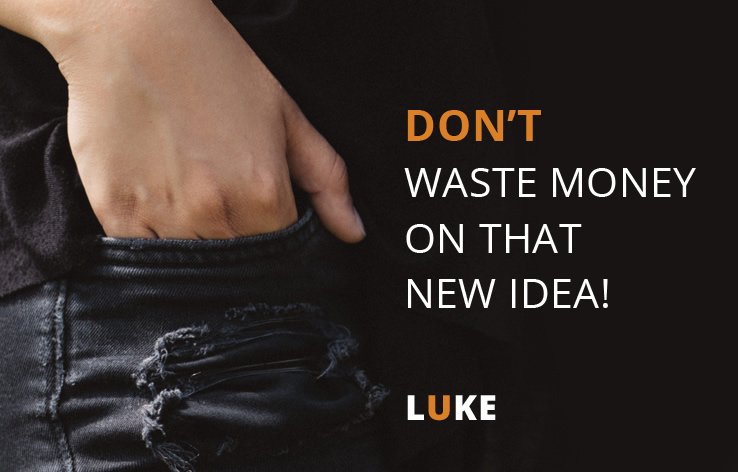When we start a new business for the first time ‘we don’t know what we don’t know’.
Therein lies the rub.
Until your new idea can be tested in front of real paying customers you are in the realm of assumption and guesswork, no matter how much research you have done. It’s a fact.
It makes perfect sense, therefore, to spend as little of your hard earned money as possible until you do so and risk as little as you can. This is what I like to call ‘intelligent bootstrapping’.
Most entrepreneurs fail at the first attempt, and the second and the third. It’s better to waste as little money and time as possible at each attempt.
“Don’t worry about funding if you don’t need it. Today it’s cheaper than ever to start a business.”
Social media is always attracted to stories of (eye watering) gazillion dollar startups but, in reality, most successful businesses are self-funded. And many more ‘bootstrap’ their new business in the evenings, at weekends and whilst still in a full time job on no more than what they can afford.
Bootstrapping is hard work but you will learn a hell of a lot in the process.
- The benefits are obvious:
You don’t have to spend time trying to find and then convince potential investors how good your idea is. The chances are they will say no anyway.
The funding trail can be emotionally and physically draining of energy and enthusiasm that could be better spent building an early following ahead of launch.
- You will gain a shed load of knowledge and experience along the way. You will learn very quickly how not to spend money and not to waste it when you do. The biggest realisation is that you need less than you think you need.
- You don’t have investors breathing down your neck. After all, they want their money back (and more).
Spending other people’s money might sound good but it comes wrapped with sharp limitations and many small business owners and entrepreneurs come to regret it.
DON’T be in a rush to give up control to investors and or a board of directors… there are other ways.
Intelligent bootstrapping
The first rule of intelligent bootstrapping is ‘you really do need less than you think and you can do much more than you think you can’.
You need to understand what you need to pay for and when. You also need to know what you can do and get for free.
Here are 5 simple rules for starting out lean and mean:
- Don’t try to offer everything to your customers; focus on your core product or service. You have plenty of time to expand your range when and if the time is right.
- Use ‘free’ first. In other words don’t signup to expensive third party software, analytics and website add-ons on day one. There are plenty of free options out there that you can use until you start making money.
To be honest I get tired of listening to online experts preaching about how to start your new business on a zero budget then proceeding to recommend dozens of expensive ‘monthly subscription’ software ‘must haves’, apps, email funnels, Facebook ads strategies, VA’s (virtual assistant) and Instagram analytics tools.
Suddenly you’re spending £250 a month on stuff you can do without. Yes, some of these options can make life easier as you grow but many can be replicated by other free solutions.
In the beginning there is a definite trade-off between time and money and the chances are you don’t have much of either, so make sure you use your time wisely.
- Don’t seek perfection on day one. Once your business is out there in front of customers you will soon realise that some of your early assumptions are no longer correct. You quickly go into a period of bug fixing, product tweaks and modifications based on customer feedback, supplier feedback and market conditions.
- Learn to say ‘no’ quickly. When you first start out you are so desperate and keen to make a sale that you can easily be suckered into sales on the wrong terms, and you under-price your product or service.
- Eliminate uncertainty. At the beginning of any new business venture there is always a high level of uncertainty. At this stage you are making lots of assumptions about how your new idea/product/service is going to work. These assumptions need to be quickly and clearly defined and tested. By doing this you reduce uncertainty and the risk of expensive mistakes.
There is nothing wrong with starting small – Remember some of the world’s most loved and successful brands started life in the family garage.
“We are currently not planning on conquering the world.”– Sergey Brin, co-founder of Google.
My name is Arthur Luke – previously creative director of the world’s biggest branding agency. I’m a branding expert, coach, blogger and lifelong entrepreneur.
For over 35 years I have been helping some or the worlds biggest brands and smallest startups, as well as my own, to find success.
Let me share that knowledge and experience with you.

